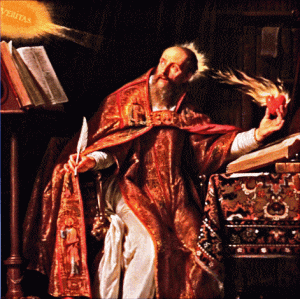Today, we suffer from a very limited (and therefore limiting) anthropology. It is an anthropology inherited from the Enlightenment and its reaction to the religious conflicts resulting from the turmoil surrounding the Reformation and Counter-Reformation. Men and women were killing one another in the name of God and therefore Enlightenment thinkers decided to begin a process where we could arrive at a common understanding by, bit by bit, bracketing God and the transcendent out of the equation (here it must be acknowledged that there are many positives that we know and experience from this move – i.e. freedom of conscience, freedom of religion, an understanding of human rights, etc.) but, there are always “unintended consequences” to actions made, and one such consequence to this “bracketing off of God and the transcendent” is a reduced human anthropology.
When we bracket off God then we can no longer authentically speak of humanity made in “the image and likeness” of God.
St. Augustine, whose feast we celebrate today, lived way before this move and therefore the anthropology found in his writings is much fuller and does not suffer from the limitations we have to deal with. His anthropology is a needed corrective to the impoverished one we have inherited.
Below is a quote from the Confessions of Saint Augustine as found in today’s office of readings. Listen to the fullness of anthropology that Augustine expresses.
Urged to reflect upon myself, I entered under your guidance into the inmost depth of my soul. I was able to do so because you were my helper. On entering into myself I saw, as it were with the eye of the soul, what was beyond the eye of the soul, beyond my spirit: in your immutable light. It was not the ordinary light perceptible to all flesh, nor was it merely something of greater magnitude but still essentially akin, shining more clearly and diffusing itself everywhere by its intensity. No, it was something entirely distinct, something altogether different from all these things; and it did not rest above my mind as oil on the surface of water, nor was it above me as heaven is above earth. This light was above me because it had made me; I was below it because I was created by it. He who has come to know the truth knows this light …
I sought a way to gain the strength which I needed to enjoy you. But I did not find it until I embraced the mediator between God and men, the man Christ Jesus, who is above all, God blessed for ever. He was calling me and saying: I am the way of truth, I am the life. He was offering the food which I lacked the strength to take, the food he had mingled with our flesh. For the Word became flesh, that your wisdom, by which you created all things, might provide milk for us children.
Augustine’s primary move was into the self to find the fullest reflection of God. Yes, all creation reflects God and is His handiwork and witnesses to God’s glory but the human self is the fullest reflection of God’s glory and therefore the best path to encounter God. As Augustine turned inward he did not find an enclosed space, limited and dark with no real connection to the rest of reality; instead he found a space on which shone the very light of God. Augustine’s “depth of the soul” is not a locked panic room but rather an open courtyard where relationship with one another and encounter with the Divine is always possible!
St. Augustine, pray for us in our impoverishment! May we learn from your wisdom!











